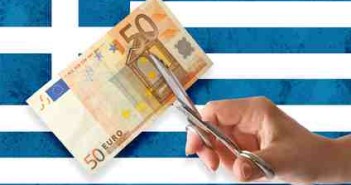Varooufakis said he would rather cut off an arm than sign an agreement without debt relief. He said this view is shared by the US government and the IMF.
And now, the IMF came out with a new report saying a large scale debt relief is needed and also 50 billion euros. Europe would have to forgive €53 billion for debt to be sustainable. Will Merkel agree? This has been a sticking point.
Potential debt relief has existed in theory for consideration, but Germany always said NO.
The IMF says that in order to meet the 2012 debt sustainability targets for Greece, Europe would have to write down debt by 30% GDP.
The deterioration in Greek finances means that the country would find it hard to pay the debt in the next three years, even with a debt write-off. Such a write-off would also need to include a delay in payments:Â Greece should have a 20-year grace period before making any debt repayments according to the organization led by Christine Lagarde.
The IMF also says that they will not participate in any third bailout without debt relief.
Update: Leak forced IMF to publish Greek debt report – why wasn’t it on the table?
The Guardian quotes a senior IMF official:
We are asking the Greeks to do very difficult things. We are also asking the Europeans to do something very difficult
And here is how the Financial Times explains the debt relief exercise:
So what would happen if, for example, Greek economic growth is just 1 per cent of GDP lower than previously projected, and Athens is able to produce a primary budget surplus of only 2.5 per cent by 2018 rather than 3.5 per cent?
Well, the IMF ran such a projection and found that the eurozone would have to write off Greece’s entire first bailout – a total of €53.1bn – just to return the country to a sustainable debt level.
Greferendum
How will this affect the referendum? Polls open on Sunday for the Greferendum amid closed banks and pressure that the vote is on Greece’s membership in the euro-zone.
The Greek government led by Alexis Tsipras will likely take advantage of this report. However, it is running an uphill struggle. With banks closed and capital controls, many Greeks may feel that voting YES they will be voting to open the banks, and with a NO, they can say goodbye to their money.
The ELA cap by the ECB surely has a significant impact on voters. The European Central Bank always says it is a “rules based institution†but the decision to cap the Emergency Liquidity Assistance and force capital controls was clearly political.
In April, ECB President Mario Draghi was interrupted at the regular press conference. A young lady through confetti on him and shouted “End ECB Dictatorshipâ€. No harm was done and she was taken away. Her words seemed a bit far out at the time.
But at the moment, the ECB, which is an un-elected body, seems to have a huge political impact.
And how will Germany react?
Merkel is likely to keep quiet and let the referendum run its course. She hopes for a YES vote that would topple the SYRIZA government and Europe could return to business as usual.
Yet without a deal that consists of debt relief, the next crisis will surely be around the corner in a matter of months.
Perhaps in order to break the current circle of events, Merkel will come out and respond positively to the report? By promising to consider debt relief, she could help Greece. and eventually also Germany.
EURUSD is stable at 1.11.



